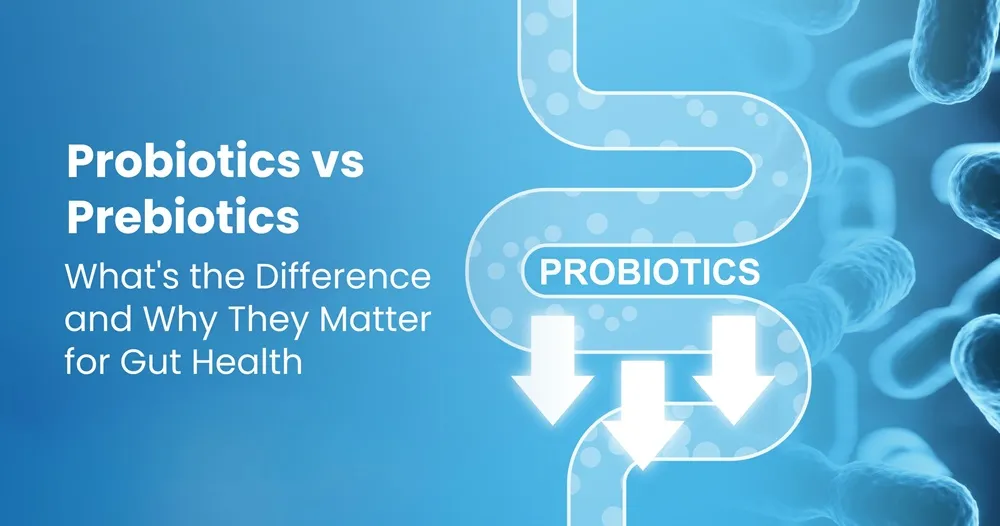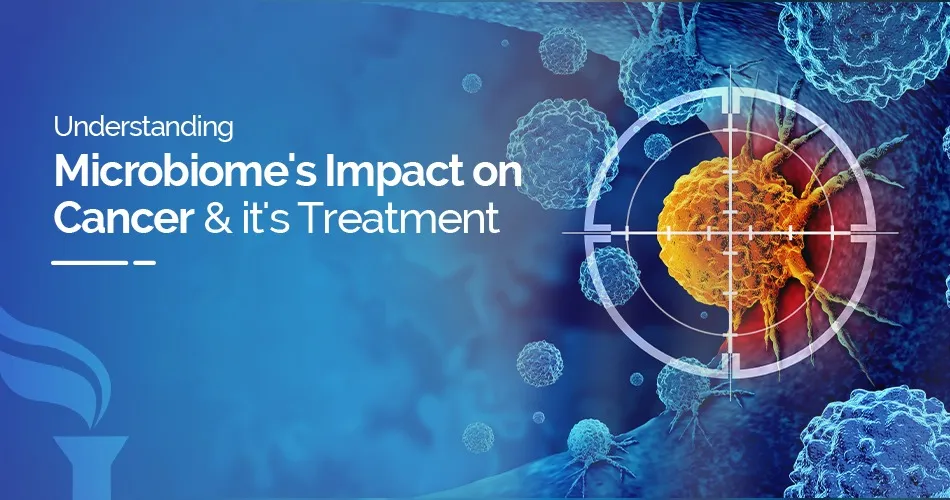Probiotics vs. Prebiotics: What's the Difference and Why They Matter for Gut Health
Apr 23, 2024

Eating a variety of foods is like giving your body a toolkit to build and maintain your health, especially your gut health. You may be familiar with the terms probiotics and prebiotics as important components of this toolkit, but what are they, and how do they differ? Probiotics are good bacteria that help maintain a balanced population of good bacteria in your digestive system. Prebiotics are non-digestible fibres that act as a meal for the good bacteria in your gut.
For those considering incorporating probiotics and prebiotics into their daily routine, it is necessary to learn how they are diverse and how they aid in gut health. This article will discuss the differences between probiotics and prebiotics, their benefits, and how to include them in your diet for the best possible gut health.
Understanding Gut Microbiome and Its Importance
The collective bacteria living in your digestive system are known as your gut microbiome. Bacteria live all over your body, including your gastrointestinal tract, which is home to over 1,000 different types of bacteria. The good bacteria in your gut protect you from harmful bacteria and fungi. These helpful bacteria have many benefits, such as:
- Supporting immune system functions
- Helping with weight management
- Easing symptoms of depression
Some of the bacteria in your stomach also produce short-chain fatty acids and vitamin K. Short-chain fatty acids are the primary source of nourishment for the cells in the large intestine. They maintain an intact bowel barrier, which is crucial for shielding against dangerous substances, bacteria, and viruses. They may also help avoid cancer and inflammation.
What Are Probiotics?
When people talk about probiotic bacteria, they usually mean two specific bacterial strains: Lactobacillus and Bifidobacterium strains. These bacteria are commonly found in probiotic supplements. In addition, many foods naturally contain probiotics through a simple fermentation process. Examples include yoghurt, kimchi, sauerkraut, and pickles.
You can buy probiotics as a food-grade supplement. They come in liquid or powder form. They can be stored in the refrigerator to keep the beneficial bacteria in probiotics alive and growing.
Benefits of Probiotics
Probiotics may be beneficial in the following areas, though research on their effects is inconclusive:
- Digestive Health
- Gastrointestinal health
- Mental health
- General health such as decreasing the need for antibiotics, gestational diabetes, vaginal infections, such as yeast infections, and eczema
Side Effects of Probiotics
Taking a particular probiotic increases the risk of adverse effects in people with Crohn's disease. Additionally, those with weakened immune systems are more susceptible to adverse effects.
The conclusion that probiotics might not be safe for individuals with significant underlying medical conditions is supported by additional research from the National Center for Complementary and Integrative Health.
What Are Prebiotics?
Unlike probiotics, prebiotics do not contain bacteria. Instead, they act as nutrients for the bacteria in your gut. Prebiotics belong to the dietary fibre group. One example is inulin, which is found in chicory root, banana, and asparagus. Other sources of prebiotics include onions, garlic, artichokes, and corn.
A food is referred to as a synbiotic when it has both prebiotics and probiotics. Prebiotics can also be added to food as commercial ingredients or taken as separate capsules. They are offered in liquid and powdered forms.
as separate capsules. They are offered in liquid and powdered forms.
Note that prebiotics alone have not been proven to be significantly beneficial. The combination of prebiotics and probiotics is more effective when consumed together.
Benefits of Prebiotics
Prebiotics are found in certain foods and are types of fibre that the body cannot digest. Instead of being broken down, they go to the gut, where they feed beneficial bacteria and other helpful organisms.
The health benefits of prebiotics and probiotics are closely linked. Prebiotics support a healthy gut by boosting digestive health, reducing the risk of infections related to antibiotic use, and offering various other health advantages. However, the full extent of their health benefits is still being explored. Prebiotics may improve your health by:
- Promoting the growth of beneficial gut bacteria, which can potentially improve metabolism and digestion,
- Slowing the body's breakdown of carbohydrates and
- Enhancing calcium absorption.
Because prebiotics naturally occur in a wide range of foods, taking prebiotic supplements is generally not necessary.
Side Effects of Prebiotics
Prebiotics don't have any adverse effects and are usually safe to consume. If adverse effects do occur, they are typically mild and may include:
- Bloating
- Abdominal discomfort
- Gas
As the environment in your gut changes and your digestive system adapts, these side effects usually go away.
How Do Prebiotics and Probiotics Interact?
Prebiotics are the food of probiotics, so sufficient availability of prebiotics is essential for their proper function. The availability of the correct prebiotics in the gut can lead to a balanced and healthy growth of probiotics while excluding harmful bacteria. Getting prebiotics and probiotics from supplements and your diet can make your system as efficient as possible.
Prebiotic Foods
By including a variety of foods in their diet, people can ensure they consume an array of prebiotics, which may fuel different strains of bacteria.
- Many prebiotics are present in high-fiber foods like fruits, vegetables, and certain whole grains.
- Some prebiotics can also be found in foods with high probiotic content.
- Babies can access prebiotics through the sugar in their mother’s breast milk.
- Prebiotics are often included in certain kid formulas.
Probiotic Foods
Several foods are rich in probiotics, including:
- Fermented foods, such as sauerkraut and kimchi
- Yoghurt
- Kombucha
- Kefir
- Fermented cheeses, such as Gouda
- Traditional fermented buttermilk.
Final Words
Most healthy individuals don't need to take prebiotic or probiotic supplements. However, incorporating a diet rich in fruits, vegetables, and whole grains can naturally provide the necessary prebiotics and probiotics to improve gut health. If you're unsure about your dietary needs or want to optimise your gut health, consulting with a healthcare professional, like a doctor or dietitian, is a smart choice.
Apollo Diagnostic provides comprehensive gut microbiome assessments and individualised dietary recommendations for people who want to learn more about their gut health or who want personalised guidance. We can assist you in understanding your gut's particular requirements by highlighting precision and care. Make an appointment right away to start improving your digestive system's health!
FAQs
1. Is it advisable to consume probiotic and prebiotic supplements?
Everybody has a unique blend of bacteria in their gut microbiome. This varies over time, depending on our surroundings and the events related to our birth.
Before taking a probiotic or prebiotic supplement, see your doctor if you have any serious medical conditions, are immunocompromised, are taking antibiotics, have inflammatory bowel disease, or any other condition.
2. How else can I maintain my stomach health?
To maintain gut health, you don't have to spend a lot of money on supplements. Consuming a diet high in plant-based nutrients and rich in colour, along with foods naturally high in probiotics and prebiotics, can significantly alter your gut microbiome.
3. Can I get enough prebiotics and probiotics from my diet alone?
Yes, most people can get an adequate amount of prebiotics and probiotics through a balanced diet rich in fruits, vegetables, whole grains, and fermented foods. Bananas, onions, garlic, leeks, asparagus, whole grains, yoghurt, and kefir are excellent sources.
- How might probiotics function?
Different probiotics may act differently in the body, and probiotics may have a range of effects. Probiotics may:
- Assist your body in keeping its microbiological community in a healthy state or in getting the microbiological community back to normal after being disturbed.
- Create substances with desired properties.
- Control the way your body reacts to immunity.
Related Blog Post
Blog Categories
- Child Health
- Mens Health
- Women's Health
- Mental Health
- Health Myths & Facts
- Fitness
- Nutrition/Recipes
- Remedies
- Weight Management
- Stress Management
- Health Supplements
- Addiction Management
- Disease Management
- Allergy
- Anemia
- Arthritis
- Asthma
- Autoimmune Diseases
- Blood Pressure
- Cancer
- Deficiencies
- Dengue/Malaria/Chikungunya
- Diabetes
- Eye Problems
- Heart Diseases
- Hepatitis
- HIV/AIDS/STD
- Hormonal Imbalance
- Infection/Flu/Viral
- Kidney
- Liver
- Menstrual Problems
- Pregnancy
- Skin & Hair Problems
- Stomach Ailments
- Thyroid
- Others
- Health Checkups
- Diagnostics/Pathology
- Lifestyle & Wellness
- Covid
- Medical Tests
- Cholesterol
- Health Tips
- Parent Care/Old Age
- Lungs
- Food Intolerance








